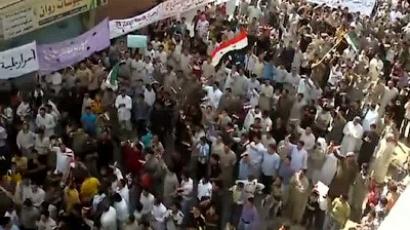US to pump weapons into Syrian warzone?
The White House and US State Department are considering arming Syria's rebels, claiming ongoing reports of government crackdowns would legitimize their actions. But it remains unclear what form the assistance would take.
Both US bodies made statements yesterday saying that new tactics would have to be adopted in order to curtail Regime forces’ bombardment of the city of Homs.White House Press Secretary Jay Carney said that the US did not want to “take actions that would lead to the further militarization of Syria,” while at the same time signaling that “additional measures” would have to be adopted if the international community fails to reach an agreement on a resolution.The press secretary did not elaborate as to the nature of these so-called “additional measures.”State department spokeswoman Victoria Nuland echoed these sentiments, saying that if Assad did not "yield to the pressure that we are all bringing to bear, we may have to consider additional measures.” She then said that no possibilities “had been taken off the table.”The statements hint at a shift in US policy where before the Obama administration had categorically ruled out the possibility of military aid.There is a strong contingent in the US congress pushing for the arming of the Syrian opposition, with Senator John McCain once again calling for military aid on Monday, although he emphasized that the US should not do so directly.Meanwhile, the opposition Syrian National Council (SNC) said on Wednesday it was coming to the view that military intervention is the only solution to the nearly year-old crisis that has killed thousands in Syria."We are really close to seeing this military intervention as the only solution. There are two evils, military intervention or protracted civil war," Basma Kodmani, a senior SNC official, told a press conference in Paris.However, General Martin Dempsey, the chairman of the US joint chief of staff warned against support until US intelligence had more information on the opposition forces at work in Syria."I think it's premature to take a decision to arm the opposition movement in Syria, because I would challenge anyone to clearly identify for me the opposition movement in Syria at this point," he said to news agency CNN.RT’s Gayane Chichakyan investigated the possible consequences of the US push for regime change in an interview with former US presidential candidate Pat Buchanan. He cited the possibility that the addition of military aid could be the catalyst that pushes Syria into chaos.“I’m against putting weapons in and aiding the anti-Assad resistance, because an all-out war there could be a disaster that leads to a failed state there,” Buchanan told Chichakyan.
Friends or foes of Syria?
The US and other UN members are due to meet in Tunisia on Friday in a Friends of Syria group forum. The group is pushing for the removal of Syrian President Bashar al-Assad and representatives of the Syrian opposition will be in attendance at the meeting. The possibility of military intervention is unlikely to be discussed with humanitarian aid and possible sanctions on Damascus taking central stage at the forum. Russia will not attend the meeting as it believes the Friends of Syria group to be biased in favor of the opposition. Aleksey Pushkov, head of the Foreign Affairs Committee in Russia's Lower House of Parliament explained Russia’s stance on the meeting to RT.“The sole purpose of that conference is not to find a way out of the current situation, but to promote the idea that the conflict can only be resolved if Assad leaves,” said Pushkov.He went on to say he had met with President Assad and representatives of two opposition organizations and that he did not get the impression that it was “the people vs. Assad in this conflict”.“A faction of the people is opposing the regime, while another part supports Mr. Assad, while yet another faction does not want Syria to fall into chaos,” Pushkov said.China’s presence at the Friends of Syria forum is also unconfirmed. The Asian nation vetoed a previous Security Council resolution on the Syrian conflict along with Russia on the basis it was unbalanced. A Chinese Foreign Ministry spokesperson said that Beijing was “currently researching the function, mechanism and other aspects of the meeting.”














